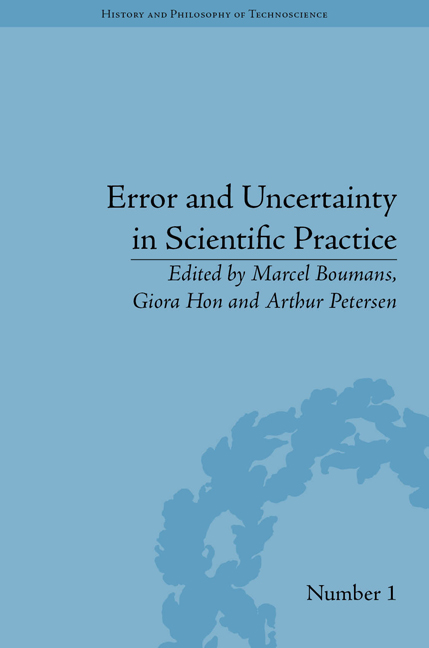Book contents
- Frontmatter
- Contents
- Acknowledgements
- List of Contributors
- List of Figures and Tables
- Introduction
- 1 The Lack of a Satisfactory Conceptualization of the Notion of Error in the Historiography of Science: Two Main Approaches and Shortcomings
- 2 Experimental Knowledge in the Face of Theoretical Error
- 3 Learning from Error: How Experiment Gets a Life (of its Own)
- 4 Modelling Measurement: Error and Uncertainty
- 5 Handling Uncertainty in Environmental Models at the Science–Policy–Society Interfaces
- 6 Variations on Reliability: Connecting Climate Predictions to Climate Policy
- 7 Order and Indeterminism: An Info-Gap Perspective
- 8 Learning from Data: The Role of Error in Statistical Modelling and Inference
- Notes
- Index
8 - Learning from Data: The Role of Error in Statistical Modelling and Inference
- Frontmatter
- Contents
- Acknowledgements
- List of Contributors
- List of Figures and Tables
- Introduction
- 1 The Lack of a Satisfactory Conceptualization of the Notion of Error in the Historiography of Science: Two Main Approaches and Shortcomings
- 2 Experimental Knowledge in the Face of Theoretical Error
- 3 Learning from Error: How Experiment Gets a Life (of its Own)
- 4 Modelling Measurement: Error and Uncertainty
- 5 Handling Uncertainty in Environmental Models at the Science–Policy–Society Interfaces
- 6 Variations on Reliability: Connecting Climate Predictions to Climate Policy
- 7 Order and Indeterminism: An Info-Gap Perspective
- 8 Learning from Data: The Role of Error in Statistical Modelling and Inference
- Notes
- Index
Summary
Introduction
‘How do we learn from data about phenomena of interest?’ is the key question underlying empirical modelling in any discipline. The discussion that follows focuses primarily on economics, but similar problems and issues arise in all applied fields. ‘Learning from data’ has a long and ambivalent history in economics that can be traced back to the seventeenth century. Despite the fact that statistics and economics share common roots going back to ‘political arithmetic’ in the mid-seventeenth century, the relationship between them has been one of mutual distrust and uneasy allegiance. They developed into separate disciplines after the demise of political arithmetic in the early eighteenth century, due mainly to:
(a) the inability of political arithmeticians to distinguish between real regularities and artefacts in observed data, combined with
(b) the irresistible proclivity to misuse data analysis in an attempt to make a case for one's favourite policies.
These excesses led political arithmeticians to exorbitant speculations and unfounded claims based on misusing the information in the data to such an extent that it eventually discredited these data-based methods beyond salvation.
Political economy (economics) was separated from political arithmetic, and established itself as the first social science at the end of the eighteenth century, partly as a result of emphasizing the role of theory, causes and explanations, and attributing a subordinate role to the data. Political economists made their case by contrasting their primarily deductive methods to the discredited data-based (inductive) methods utilized by political arithmeticians.
- Type
- Chapter
- Information
- Error and Uncertainty in Scientific Practice , pp. 177 - 208Publisher: Pickering & ChattoFirst published in: 2014



